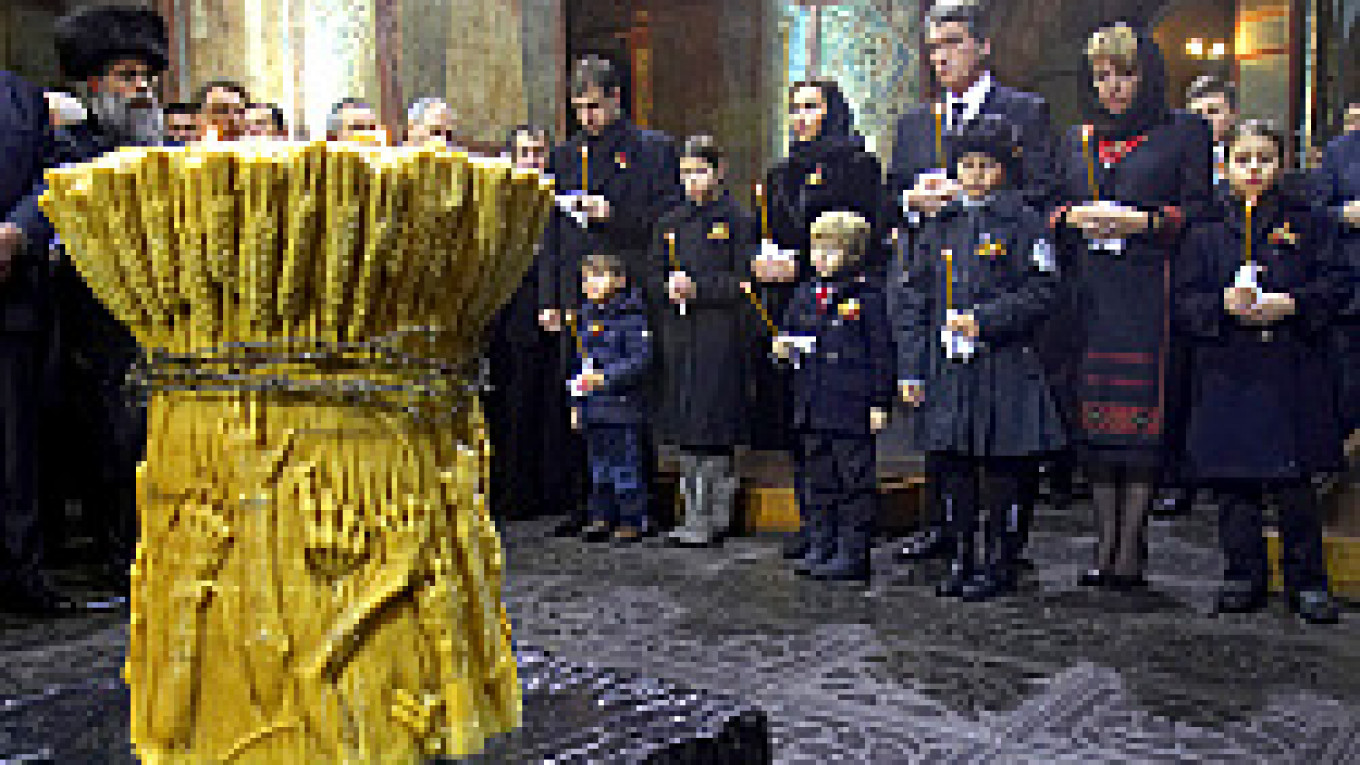Yushchenko was speaking at the opening of a 26-meter monument to mark the 75th anniversary of the famine at ceremonies boycotted by the Russian president.
Russia objects to Ukraine's insistence that the famine amounts to "genocide" against Ukraine's people.
The anniversary of Holodomor -- or Death by Hunger as it is known in Ukraine -- is traditionally marked in late November, when the food shortages began.
Yushchenko insists that the famine was aimed at rooting out Ukrainian nationalism, targeting the heart of the nation, its peasants, and thus is an act of genocide.
"We appeal to everyone, above all the Russian Federation, to be true, honest and pure before their brothers in denouncing the crimes of Stalinism and the totalitarian Soviet Union," Yushchenko told guests shivering in snow and drizzle.
"We were all together in the same hell. We reject the brazen lie that we are blaming any one people for our tragedy. This is untrue. There is one criminal: the imperial, communist Soviet regime."
Historians say some 7.5 million people died in the famine, and Soviet authorities denied for decades that it had occurred.
In the fall of 1932, authorities confiscated grain, livestock and other food in villages across the Soviet Union after peasants failed to meet grain quotas that exceeded crop yields. The Soviet Union exported the grain to build factories and arm its military.
Residents were prohibited to leave their homes -- effectively condemning them to starvation, and survivors say people ate dogs, grass and that cases of cannibalism were widespread. The famine was a closely guarded secret in the Soviet times.
Yushchenko had earlier avoided references to Russia in restating his conviction that the famine was "genocide."
"The famine of 1932-33 was not death by starvation, it was murder through starvation. This was the essence of the genocide. ... It was an artificial famine with a clear aim and clearly planned," he told a conference in Kiev's opera house.
Russia dismisses any such notion, saying many ethnic groups were affected. President Dmitry Medvedev did not attend the ceremonies and accused Yushchenko of distorting history.
Georgian President Mikhail Saakashvili, who like Yushchenko is seeking NATO membership for his ex-Soviet state, went further though he also refrained from referring to Moscow.
Saakashvili said attempts to downplay the famine showed that "the ideology of evil remains alive. Even 75 years after the tragedy, the seeds of evil still grow in some individuals."
Several hundred Ukrainians braved snow and cold to light candles outside the golden-domed St. Michael cathedral in Kiev in memory of those who perished.
"It is the pain and wound of the Ukrainian people," said a sobbing Valentyna Mayboroda, a 57-year-old retired government worker whose uncle disappeared and was believed to have fallen victim to cannibals. (Reuters, AP)
A Message from The Moscow Times:
Dear readers,
We are facing unprecedented challenges. Russia's Prosecutor General's Office has designated The Moscow Times as an "undesirable" organization, criminalizing our work and putting our staff at risk of prosecution. This follows our earlier unjust labeling as a "foreign agent."
These actions are direct attempts to silence independent journalism in Russia. The authorities claim our work "discredits the decisions of the Russian leadership." We see things differently: we strive to provide accurate, unbiased reporting on Russia.
We, the journalists of The Moscow Times, refuse to be silenced. But to continue our work, we need your help.
Your support, no matter how small, makes a world of difference. If you can, please support us monthly starting from just $2. It's quick to set up, and every contribution makes a significant impact.
By supporting The Moscow Times, you're defending open, independent journalism in the face of repression. Thank you for standing with us.
Remind me later.


